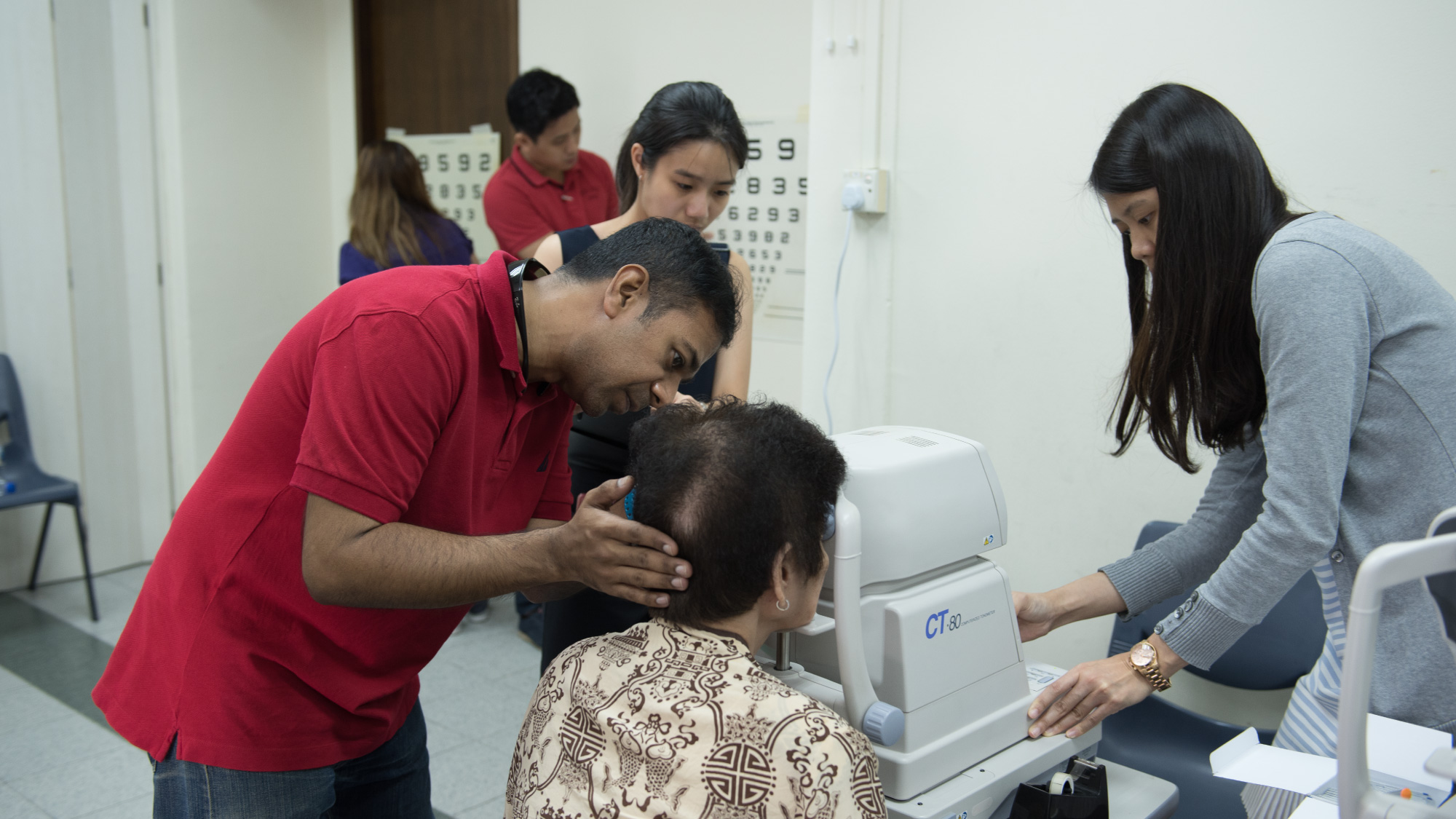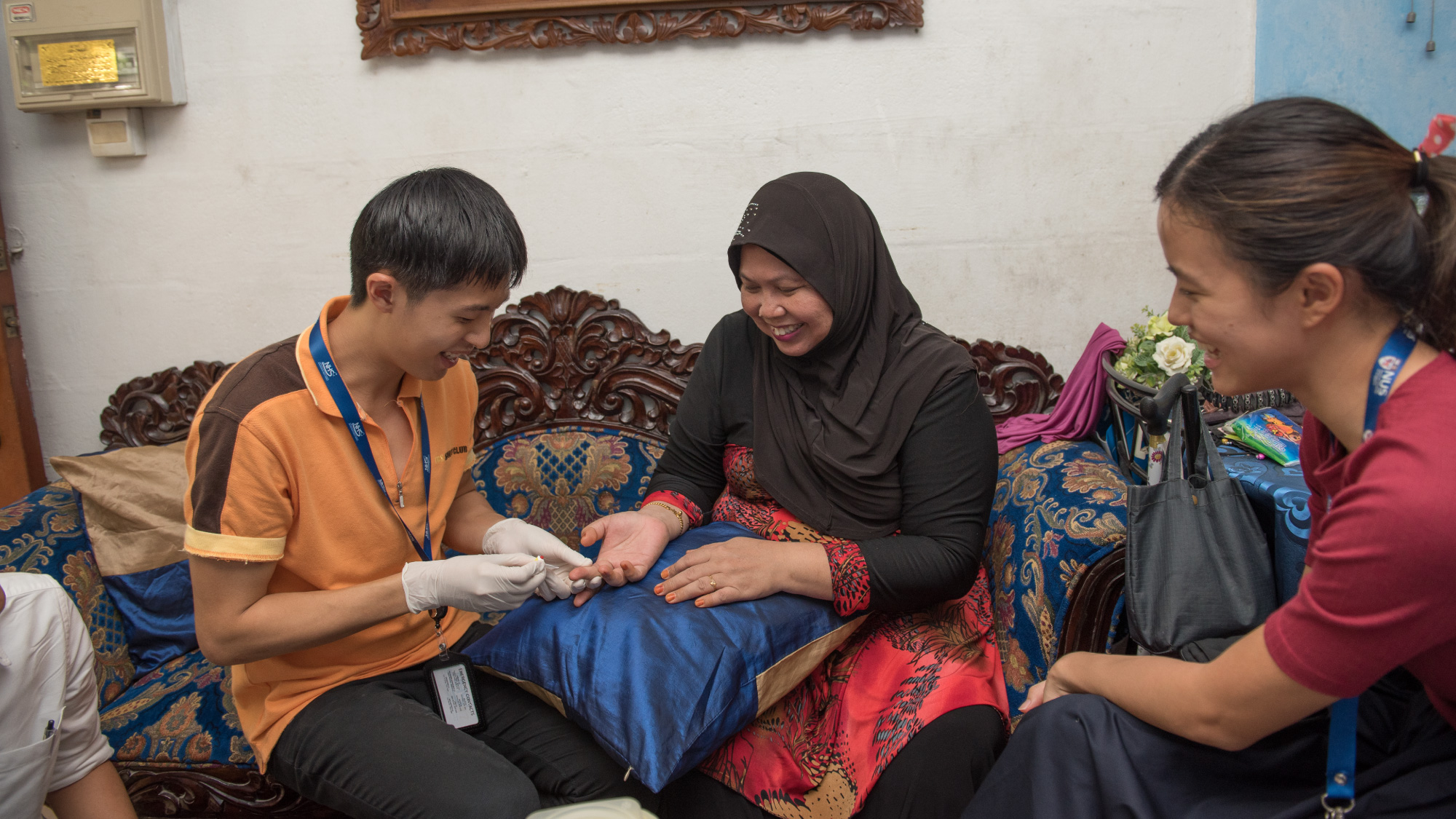Neighbours First – An Unwavering Commitment to Serve
By Tseng Fan Shuen and Kwek Xin Yi Rachel
Phase II Medicine students
Project Directors, Neighbourhood Health Service 2017
In 2007, a small group of passionate and committed medical students congregated to discuss the possibility of starting a new health screening project focussed on serving residents living in HDB rental apartments. They gathered what little funds and resources they had and proceeded to introduce Singapore’s first, student-organised and led, health screening service to residents in Taman Jurong.
Eleven years later, the Neighbourhood Health Service (NHS) has progressed by leaps and bounds to become one of NUS Medicine’s flagship health service projects, having served more than 4000 residents in eight different districts. It now offers 26 screening services and modalities – from just three at the beginning – managed by the committee and more than 10 other health service providers in Singapore.
“It’s heartening to see how far we have come, from humble beginnings to where we are now. It has become bigger than what we have imagined, and most importantly, I’m glad to see that throughout the years, despite the many changes the desire to serve has remained the same,” said Dr Chiong Yee-Keow, the director of the pioneering NHS committee.
NHS identifies residents-in-need, especially the elderly and residents living in rental blocks, and reconnects them to the healthcare system. This is achieved through (i) free health screenings (at a centralised venue and also via door-to-door visits for immobile residents), and (ii) rigorous follow-ups via house visits and phone calls to residents with abnormal screening results.
During health screenings and follow-up sessions, calibrated efforts are taken to break down the financial, psychological, physical and knowledge barriers to healthcare that many residents face. For example, NUS Social Work students evaluate the socio-economic situation of residents, and refer them to relevant regional social organisations to help ensure that the residents’ holistic socio-economic needs are met.
NHS finds its place in Singapore’s public health sphere by serving the underserved. MOH has placed a heavy emphasis on chronic conditions by rolling out the enhanced $5/2/0 Screen For Life Programme and declaring a “war” on diabetes. However, the rental block community will likely continue to face barriers to healthcare and remain disconnected from the healthcare system without active engagement.
The 2017 Committee has worked tirelessly over the past year to execute key initiatives at this year’s screenings. These include the introduction of a Fall Risk Assessment, Geriatric Dementia and Depression Assessment; revamped health education materials to include a health promotional video, gamification and behavioural change/ pedagogical frameworks to increase health-seeking behaviour; stronger partnerships with Regional Health Systems, Agency for Integrated Care and Ministry of Health to build capabilities and expand resources; new collaborations with organisations to offer advanced screening and treatment-based services, including free colonoscopy referrals and free spectacles; profiling and risk stratification to help residents understand their risks of developing chronic conditions, as well as expanded publicity efforts with the creation of a new website and corporate video.
The screenings conducted at Eunos Crescent and Kampong Glam earlier in September and October 2017 saw a total of over 895 residents served by 941 student volunteers from NUS Medicine, Nursing, Social Work and the NTU Lee Kong Chian School of Medicine. Each screening cycle consists of pre-screening publicity held one week prior to the screening, where the committee carries out door-to-door publicity; as well as post-screening follow-up held two weeks after the screening, where blood test results are delivered and explained to the residents face-to-face.
Indeed, it is this continued dedication and hard work invested by the committee and volunteers that will make a positive difference in the lives of these residents.
The 2017 Committee would like to thank all residents, volunteers, partners and sponsors for their unwavering support over the past year. The next committee will continue to improve and adapt amidst the changing healthcare landscape, while always standing firm by our passion to make a positive difference in the community.
For more information, please email yllsom.nhs@gmail.com or visit www.neighbourhoodhealthservice.com.

A resident undergoing advanced eye screening, managed by Singapore Eye Research Institute and Singapore National Eye Centre. NHS works with more than 10 health service providers to offer residents a comprehensive screening package.

Volunteers performing a Random Capillary Blood Glucose measurement for a resident to monitor her transient blood glucose level.
